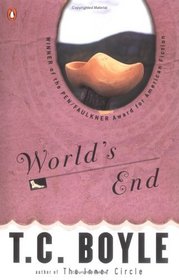This was a very interesting book with multiple flashbacks and great characters.
I'm a big fan of T.C. Boyle and have read several of his novels and short story collections. World's End won the 1988 PEN/Faulkner Award for American Fiction and is also listed in the "1001 Books You Must Read Before You Die." The novel is a set of two parallel stories taking place in the Hudson Valley. It tells the story of the Van Brunts who seem to be cursed with bad luck dating back to when the family settled in New Amsterdam in the 17th century. Then there are the Van Warts who were the tormentors of the Van Brunts in the 1600s and hold the higher ground as such in the 1960s. The story focuses on Walter Van Brunt in the 1960s who crashes his motorcycle into an historical marker telling of the uprising in 1693 against the Van Wart manor. Walter loses his foot in this crash and later in another crash loses his other foot. And back in the 1600s, his ancestor, Jeremias Van Brunt loses his foot to a snapping turtle. The book shifts back and forth from these two time periods with similar stories for both generations. The book is full of well-drawn characters including the Kitchwank tribe, the lords of the manor (patroons), and the lowly tenant farmers who must pay their due to the patroon and who are treated pretty much as slaves. Along the way in 1968, Walter is also trying to find his father who people say betrayed his left-wing mother and friends during a riot in 1949.
Boyle did his research on this novel. The historical background for the different time periods was such that you could imagine living in the Dutch colonies of New Amsterdam in the 1600s or in the anti-communist era of the 1940s and on into the hippie movement of the 1960s. The novel encompassed a wide-range of ideologies and emotions including racism, narrow mindedness, greed, and betrayal. Although I wouldn't consider this Boyle's best, it was overall another very well written and compelling novel that is definitely well worth the effort to read.
Boyle did his research on this novel. The historical background for the different time periods was such that you could imagine living in the Dutch colonies of New Amsterdam in the 1600s or in the anti-communist era of the 1940s and on into the hippie movement of the 1960s. The novel encompassed a wide-range of ideologies and emotions including racism, narrow mindedness, greed, and betrayal. Although I wouldn't consider this Boyle's best, it was overall another very well written and compelling novel that is definitely well worth the effort to read.




![header=[] body=[Get a free book credit right now by joining the club and listing 5 books you have and are willing to share with other members!] Help icon](/images/question.gif?v=90afaeb39)
